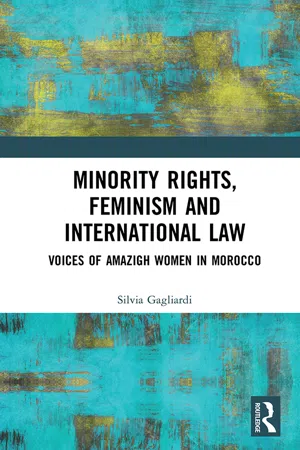
Minority Rights, Feminism and International Law
Voices of Amazigh Women in Morocco
- 190 pages
- English
- ePUB (mobile friendly)
- Available on iOS & Android
About this book
Investigating minority and indigenous women's rights in Muslim-majority states, this book critically examines the human rights regime within international law.
Based on extensive and diverse ethnographic research on Amazigh women in Morocco, the book unpacks and challenges generally accepted notions of rights and equality. Significantly, and controversially, the book challenges the supposedly 'emancipatory' power vested in the human rights project; arguing that rights-based discourses are sites of contestation for different groups that use them to assert their agency in society. More specifically, it shows how the very conditions that make minority and indigenous women instrumental to the preservation of their culture may condemn them to a position of subalternity. In response, and engaging the notion and meaning of Islamic feminism, the book proposes that feminism should be interpreted and contextualised locally in order to be effective and inclusive, and so in order for the human rights project to fully realise its potential to empower the marginalised and make space for their voices to be heard.
Providing a detailed, empirically based, analysis of rights in action, this book will be of relevance to scholars, students and practitioners in human rights policy and practice, in international law, minorities' and indigenous peoples' rights, gender studies, and Middle Eastern and North African Studies.
Frequently asked questions
- Essential is ideal for learners and professionals who enjoy exploring a wide range of subjects. Access the Essential Library with 800,000+ trusted titles and best-sellers across business, personal growth, and the humanities. Includes unlimited reading time and Standard Read Aloud voice.
- Complete: Perfect for advanced learners and researchers needing full, unrestricted access. Unlock 1.4M+ books across hundreds of subjects, including academic and specialized titles. The Complete Plan also includes advanced features like Premium Read Aloud and Research Assistant.
Please note we cannot support devices running on iOS 13 and Android 7 or earlier. Learn more about using the app.
Information
Chapter 1
Theoretical framework*
1.1 Human rights: universality vs relativity
Table of contents
- Cover
- Half Title
- Title Page
- Copyright Page
- Table of Contents
- List of abbreviations
- Preface
- Acknowledgements
- Introduction
- 1. Theoretical framework
- 2. The politics of rights: Morocco’s human rights structure
- 3. Shaping narratives in Moroccan society
- 4. Mapping over the Amazigh body
- Conclusion
- Bibliography
- Appendix I: Confidentiality Form for Translators
- Appendix II: Participant Information Sheet
- Appendix III: Participant Consent Form
- Index